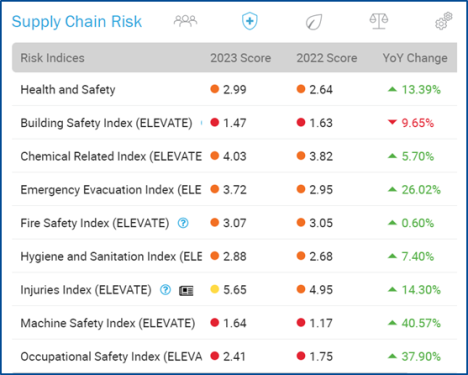10 Years on From Rana Plaza: A Closer Look at Supply Chain Risk Since the Tragedy
Ten years later, the 2013 Rana Plaza disaster remains one of the deadliest factory accidents in recent history.
While Bangladesh has made strides in factory safety and remediation, the anniversary of the building collapse that killed 1,134 is still a woeful reminder of the work that remains to be done to protect factory workers in Bangladesh and worldwide.
Bangladesh has become one of the world’s leading apparel exporters, just second after China, with its ready-made garments (RMG) sector being a major contributor to its economy.
The country is home to more than 4 million garment workers and ELEVATE audit data shows how many key supply chain risk indices in Bangladesh remain at critical risk levels. A New York Stern for Business and Human Rights report published this month also examined how purchasing practices are having a detrimental impact on the livelihood of the garment worker population in Bangladesh, even in current times.
Building Safety is still an Extreme Risk for Supply Chains
Data within our supply chain intelligence platform EiQ, which rates countries and commodities on inherent risk levels, shows a set of “Extreme Risk” indices for Bangladesh, which include Building Safety, Freedom of Association, Machine Safety, and Working Hours.
Bangladesh’s Building Safety score decreased within the last year, becoming higher in risk, indicating critical violations were detected from onsite audits in the country. The country did, however, exhibit signs of significant improvement in every other Health and Safety related indicator in the past year.
Sentinel, our adverse media scanning tool, detected recent news stories from Bangladesh that have highlighted various incidents that still raise concerns about the country’s management of health, safety, and labor standards within the manufacturing sector. Numerous fires in garment factories have resulted in significant loss of life, injuries, and damage to property, according to Sentinel data, pointing to the urgent need for improved fire safety measures and building standards.

Garment Workers Still Suffer from Exploitation
Brands and retailers’ purchasing practices affect the economic viability of manufacturers and, in turn, the treatment of workers. Factory safety has improved since Rana Plaza, but buyers’ purchasing practices continue to create conditions that lead suppliers to exploit their employees.
The NYU Stern Center report linked practices such as cutting prices and lead times with supplier decisions to rely on unauthorized subcontracting factories, which are often less safe and lack basic facilities. Oxfam connected poor labor standards to brands and retailers’ sourcing and purchasing practices, as frequent style changes and reduced order sizes put suppliers at a disadvantage.
Fast fashion and e-commerce trends have exacerbated problems with purchasing practices, making it difficult for companies to have sufficient oversight of working conditions in their vast supply chains, according to the report.
The International Labor Organization found that low prices led suppliers to cut wages and benefits, and inadequate lead times increased production costs and put downward pressure on wages.
These findings are reflected in our data, as Bangladesh’s Wages Index score dropped more than 35% since last year, and remains “High Risk” for the country.
10 Years On: Increased Scrutiny is Still Required
The bottom line of these findings reveals that increased scrutiny is still required in Bangladesh, even a decade following a catastrophe that brought to light the urgent need to enhance worker safety.
While progress has been made in improving factory safety since the Rana Plaza collapse, concerns about workers’ safety, working conditions, and labor rights still persist. Ensuring that factories continue to adhere to the highest safety standards and protect workers’ rights remains essential.
These blogs are written by ELEVATE staff members or associates and the views and opinions expressed are not necessarily those of ELEVATE.
About the author
